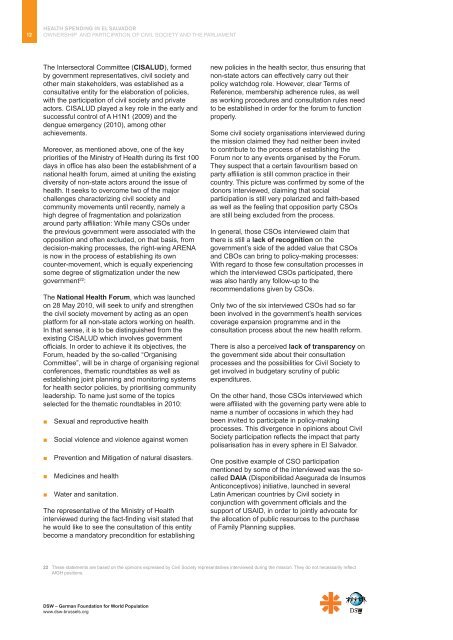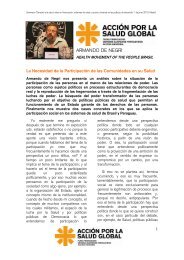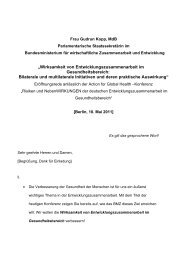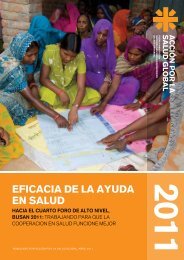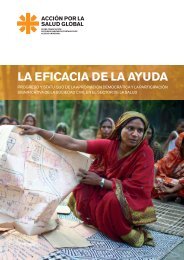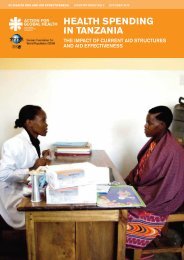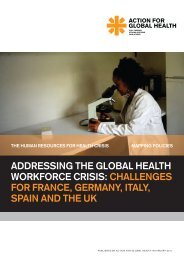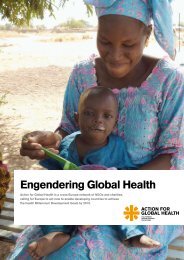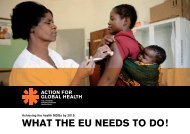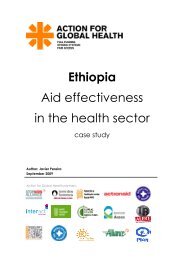HEALTH SPENDING IN EL SALVADOR - euroresources.org
HEALTH SPENDING IN EL SALVADOR - euroresources.org
HEALTH SPENDING IN EL SALVADOR - euroresources.org
Create successful ePaper yourself
Turn your PDF publications into a flip-book with our unique Google optimized e-Paper software.
12<br />
<strong>HEALTH</strong> <strong>SPEND<strong>IN</strong>G</strong> <strong>IN</strong> <strong>EL</strong> <strong>SALVADOR</strong><br />
OWNERSHIP AND PARTICIPATION OF CIVIL SOCIETY AND THE PARLIAMENT<br />
The Intersectoral Committee (CISALUD), formed<br />
by government representatives, civil society and<br />
other main stakeholders, was established as a<br />
consultative entity for the elaboration of policies,<br />
with the participation of civil society and private<br />
actors. CISALUD played a key role in the early and<br />
successful control of A H1N1 (2009) and the<br />
dengue emergency (2010), among other<br />
achievements.<br />
Moreover, as mentioned above, one of the key<br />
priorities of the Ministry of Health during its first 100<br />
days in office has also been the establishment of a<br />
national health forum, aimed at uniting the existing<br />
diversity of non-state actors around the issue of<br />
health. It seeks to overcome two of the major<br />
challenges characterizing civil society and<br />
community movements until recently, namely a<br />
high degree of fragmentation and polarization<br />
around party affiliation: While many CSOs under<br />
the previous government were associated with the<br />
opposition and often excluded, on that basis, from<br />
decision-making processes, the right-wing ARENA<br />
is now in the process of establishing its own<br />
counter-movement, which is equally experiencing<br />
some degree of stigmatization under the new<br />
government 22 :<br />
The National Health Forum, which was launched<br />
on 28 May 2010, will seek to unify and strengthen<br />
the civil society movement by acting as an open<br />
platform for all non-state actors working on health.<br />
In that sense, it is to be distinguished from the<br />
existing CISALUD which involves government<br />
officials. In order to achieve it its objectives, the<br />
Forum, headed by the so-called “Organising<br />
Committee”, will be in charge of <strong>org</strong>anising regional<br />
conferences, thematic roundtables as well as<br />
establishing joint planning and monitoring systems<br />
for health sector policies, by prioritising community<br />
leadership. To name just some of the topics<br />
selected for the thematic roundtables in 2010:<br />
■ Sexual and reproductive health<br />
■ Social violence and violence against women<br />
■ Prevention and Mitigation of natural disasters.<br />
■ Medicines and health<br />
■ Water and sanitation.<br />
The representative of the Ministry of Health<br />
interviewed during the fact-finding visit stated that<br />
he would like to see the consultation of this entity<br />
become a mandatory precondition for establishing<br />
new policies in the health sector, thus ensuring that<br />
non-state actors can effectively carry out their<br />
policy watchdog role. However, clear Terms of<br />
Reference, membership adherence rules, as well<br />
as working procedures and consultation rules need<br />
to be established in order for the forum to function<br />
properly.<br />
Some civil society <strong>org</strong>anisations interviewed during<br />
the mission claimed they had neither been invited<br />
to contribute to the process of establishing the<br />
Forum nor to any events <strong>org</strong>anised by the Forum.<br />
They suspect that a certain favouritism based on<br />
party affiliation is still common practice in their<br />
country. This picture was confirmed by some of the<br />
donors interviewed, claiming that social<br />
participation is still very polarized and faith-based<br />
as well as the feeling that opposition party CSOs<br />
are still being excluded from the process.<br />
In general, those CSOs interviewed claim that<br />
there is still a lack of recognition on the<br />
government’s side of the added value that CSOs<br />
and CBOs can bring to policy-making processes:<br />
With regard to those few consultation processes in<br />
which the interviewed CSOs participated, there<br />
was also hardly any follow-up to the<br />
recommendations given by CSOs.<br />
Only two of the six interviewed CSOs had so far<br />
been involved in the government’s health services<br />
coverage expansion programme and in the<br />
consultation process about the new health reform.<br />
There is also a perceived lack of transparency on<br />
the government side about their consultation<br />
processes and the possibilities for Civil Society to<br />
get involved in budgetary scrutiny of public<br />
expenditures.<br />
On the other hand, those CSOs interviewed which<br />
were affiliated with the governing party were able to<br />
name a number of occasions in which they had<br />
been invited to participate in policy-making<br />
processes. This divergence in opinions about Civil<br />
Society participation reflects the impact that party<br />
polisarisation has in every sphere in El Salvador.<br />
One positive example of CSO participation<br />
mentioned by some of the interviewed was the socalled<br />
DAIA (Disponibilidad Asegurada de Insumos<br />
Anticonceptivos) initiative, launched in several<br />
Latin American countries by Civil society in<br />
conjunction with government officials and the<br />
support of USAID, in order to jointly advocate for<br />
the allocation of public resources to the purchase<br />
of Family Planning supplies.<br />
22 These statements are based on the opinions expressed by Civil Society representatives interviewed during the mission. They do not necessarily reflect<br />
AfGH positions.<br />
DSW – German Foundation for World Population<br />
www.dsw-brussels.<strong>org</strong>


